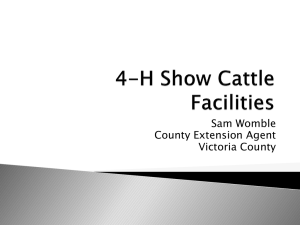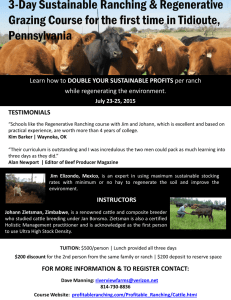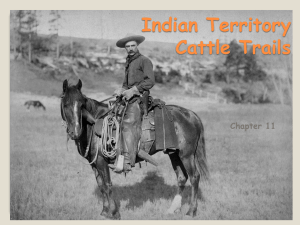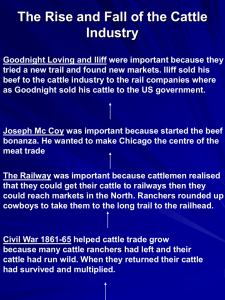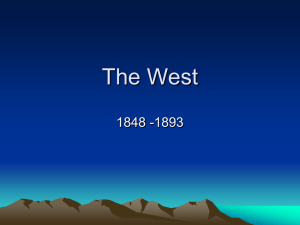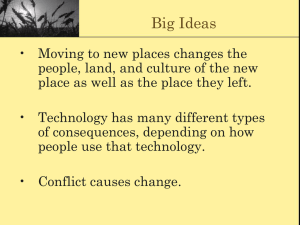Module 9: Diversification and Income Earning Opportunities
advertisement
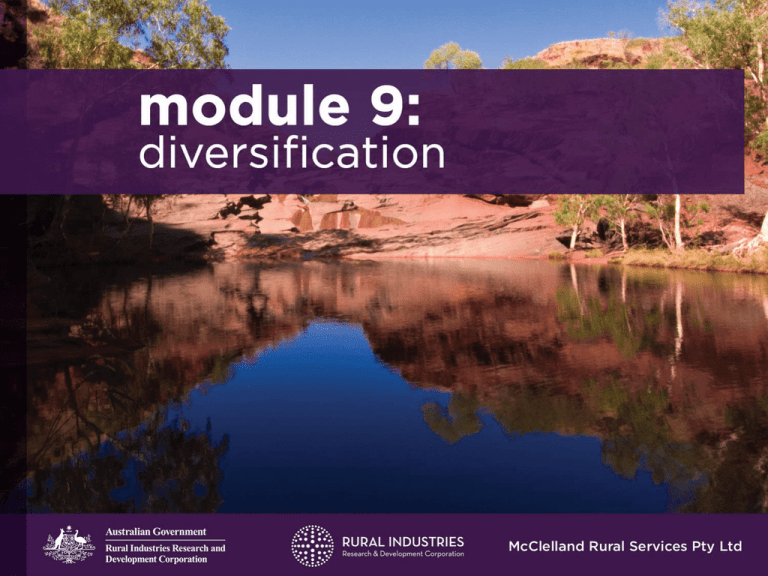
Disclaimer The information contained in the nine (9) PowerPoint presentations is intended for general use to assist qualified Extension Officers to communicate the material covered in the Manual “Managing Indigenous Pastoral Lands” to Indigenous pastoralists and their advisors and other stakeholders. It includes general statements based on scientific research. Extension officers are advised to seek training in the delivery of the PowerPoints where necessary. Trainers and audiences are advised, and need to be aware, that this information may be incomplete or unsuitable for use in specific situations. Whilst all care has been taken to ensure that all information is true and correct at the time of publication, McClelland Rural Services Pty Ltd gives no warranty or assurance, and make no representation as to the accuracy of any material or advice contained in these PowerPoints. Before taking any action or decision based on the information in the PowerPoint presentations, readers should seek expert professional, scientific, technical and legal advice. To the extent permitted by law, the McClelland Rural Services Pty Ltd (including its employees and consultants), the authors and its partners do not assume liability of any kind whatsoever resulting from any person’s use or reliance upon the contents of these PowerPoints, or if changes are made to them. WARNING: Aboriginal and Torres Strait Islander attendees should be aware that the following presentations may contain images or names of people who have since passed away. Opportunities Opportunities • Community members can earn income by diversification away from the straight running of their cattle stations: o if owners of land do not have enough cattle o if members cannot find work on their own land Opportunities • Use business strengths to: o sub-lease or take in agistment for others to run their cattle o provide contract services and labour to cattle stations o earn incomes from mining, tourism, meat processing, and carbon farming • Make a business plan first, for income earning activities Sub-Leasing Sub-Leasing Traditional Owners make written agreements for others to use their property by subleasing or granting grazing licences (in NT) for a fee • longer terms 5+5 years or more • may apply to all or part of the property • multiple agreements can exist on one property (properly identify cattle) • remuneration can also include capital works, training and employment Agistment Agistment Traditional Owners can make written agreements for others to agist cattle on their property for a fee • Shorter terms, around one year • May apply to all or part of the property • Multiple agreements can exist on one property but cattle need to be properly identified • State whether stock are able to run together or kept separate Contracting Services Contracting Services Off farm income can be earned by contracting to supply services to other pastoralists through • Contract mustering • Fencing and yard building • Civil works contracts for earth moving and road works • Weed and feral animal control for stations and parks Establishing and Managing a Contracting Business • Apply for an Australian Business Number (ABN) • Obtain Public Liability Insurance • Obtain a Workers Compensation policy • Deduct Pay as You Go (PAYG) Taxation • Control work done so there is no dispute with property owner Contracting Services Example of Mustering Contract CONTRACTOR • Quote as ‘price per head ’(for all cattle that come through the yards) • Supply all labour plant and equipment to complete the job (may include helicopters) • Deliver all weaners and sale cattle to main station yards • Agree on husbandry practices (branding, dehorning, etc.) • Keep an accurate account of cattle numbers, records, descriptions and return cattle to original paddock Contracting Services Example of Mustering Contract OWNER • Supply agreed chemicals and vaccines • Supply gas for branding and all brands and earmarks • Provide all hay and feed for weaners and sale cattle Direct Employment in Cattle Industry Direct Employment in Cattle Industry • Indigenous cattle stations (ILC and Non-ILC). • Non Indigenous cattle stations • Both Indigenous and Non-Indigenous stations advertise nationally in rural newspapers and online • Contact ILC, ILS, IPP, your local Aboriginal Corporation or cattle companies direct • Training providers and institutes can also advise of employment opportunities Mining Mining Royalties and Employment Mining companies may • Pay royalties and limited cash compensation to communities if their activities affect aboriginal land • Offer employment and training under corporate social responsibility policies • Offer seed funding for small business establishment • Protect heritage Tourism Tourism Tourism provides: • Employment and income opportunities o Ecotourism o Creative artistic and cultural activities • Training in tourism, hospitality, automotive, mechanical and horticulture e.g. Home Valley, East Kimberley • General employment in Non-Indigenous tourism ventures and in hospitality in the region Home Valley Station with Tourist Complex Bindoola Falls Home Valley Home Valley Small Scale Abattoirs Small Scale Abattoirs Abattoirs provide: • Opportunities to kill and process own cattle • Retail through local butcher shops and sell to wholesalers • Ability to sell beef to aboriginal tourism ventures • Training and employment in processing and marketing Carbon Farming Carbon Farming Initiative (CFI) • A carbon offset scheme to reduce greenhouse gas pollution by storing carbon or reducing emissions • Australian Carbon Credit Units created under the CFI- sell to Australian industry to help meet their regulatory requirements for pollution reduction Carbon Farming Savanna fires • greatest source of greenhouse emissions in the NT • management projects - create carbon credits by strategic early dry season burning to reduce wildfire emissions later in the year • earn income, provide employment, strengthen ties to culture and country, opportunity for Indigenous people to stay on their ancestral lands • check eligibility and contact ILC for assistance with proposals Diversification Summary • Sub-let stations and others need staff to run stock (e.g. contract muster), control weeds and feral animals, build and repair fences, yards, waters and roads • Expanding tourism and mining provide remote pastoral communities with employment and income opportunities • Prospects exist in meat processing, carbon farming and as rangers • Training will allow you to join the main stream in providing goods and services to the cattle industry
